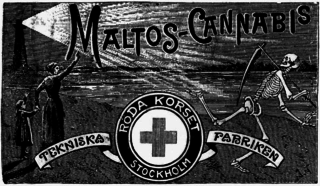
Tetrahydrocannabinol (THC) is the principal psychoactive constituent of cannabis and one of at least 113 total cannabinoids identified on the plant. Although the chemical formula for THC (C21H30O2) describes multiple isomers, the term THC usually refers to the Delta-9-THC isomer with chemical name (−)-trans-Δ9-tetrahydrocannabinol. THC is a terpenoid found in cannabis and, like many pharmacologically active phytochemicals, it is assumed to be involved in the plant's evolutionary adaptation against insect predation, ultraviolet light, and environmental stress. THC was first discovered and isolated by Israeli chemist Raphael Mechoulam in Israel in 1964. It was found that, when smoked, THC is absorbed into the bloodstream and travels to the brain, attaching itself to endocannabinoid receptors located in the cerebral cortex, cerebellum, and basal ganglia. These are the parts of the brain responsible for thinking, memory, pleasure, coordination and movement.

Medical cannabis, or medical marijuana (MMJ), is cannabis and cannabinoids that are prescribed by physicians for their patients. The use of cannabis as medicine has not been rigorously tested due to production and governmental restrictions, resulting in limited clinical research to define the safety and efficacy of using cannabis to treat diseases.

Cannabinoids are several structural classes of compounds found in the cannabis plant primarily and most animal organisms or as synthetic compounds. The most notable cannabinoid is the phytocannabinoid tetrahydrocannabinol (THC) (delta-9-THC), the primary psychoactive compound in cannabis. Cannabidiol (CBD) is also a major constituent of temperate cannabis plants and a minor constituent in tropical varieties. At least 113 distinct phytocannabinoids have been isolated from cannabis, although only four have been demonstrated to have a biogenetic origin. It was reported in 2020 that phytocannabinoids can be found in other plants such as rhododendron, licorice and liverwort, and earlier in Echinacea.

Cannabidiol (CBD) is a phytocannabinoid discovered in 1940. It is one of 113 identified cannabinoids in cannabis plants, along with tetrahydrocannabinol (THC), and accounts for up to 40% of the plant's extract. As of 2019, clinical research on CBD included studies related to anxiety, cognition, movement disorders, and pain, but there is insufficient high-quality evidence that cannabidiol is effective for these conditions. Nevertheless, CBD is a herbal dietary supplement promoted with unproven claims of particular therapeutic effects.

Tetrahydrocannabivarin is a homologue of tetrahydrocannabinol (THC) having a propyl (3-carbon) side chain instead of pentyl (5-carbon), making it non-psychoactive in lower doses. It has been shown to exhibit neuroprotective activity, appetite suppression, glycemic control and reduced side effects compared to THC, making it a potential treatment for management of obesity and diabetes.

Nabilone, sold under the brand name Cesamet among others, is a synthetic cannabinoid with therapeutic use as an antiemetic and as an adjunct analgesic for neuropathic pain. It mimics tetrahydrocannabinol (THC), the primary psychoactive compound found naturally occurring in Cannabis.

Nabiximols is a specific Cannabis extract that was approved in 2010 as a botanical drug in the United Kingdom. Nabiximols is sold as a mouth spray intended to alleviate neuropathic pain, spasticity, overactive bladder, and other symptoms of multiple sclerosis; it was developed by the UK company GW Pharmaceuticals. In 2019, it was proposed that following application of the spray, nabiximols is washed away from the oral mucosa by the saliva flow and ingested into the stomach, with subsequent absorption from the gastro-intestinal tract. Nabiximols is a combination drug standardized in composition, formulation, and dose. Its principal active components are the cannabinoids: tetrahydrocannabinol (THC) and cannabidiol (CBD). Each spray delivers a dose of 2.7 mg THC and 2.5 mg CBD.
Expanded access or compassionate use is the use of an unapproved drug or medical device under special forms of investigational new drug applications (IND) or IDE application for devices, outside of a clinical trial, by people with serious or life-threatening conditions who do not meet the enrollment criteria for the clinical trial in progress.
Geoffrey William Guy is a British pharmacologist, physician, businessman and academic, who co-founded GW Pharmaceuticals and has developed treatments using compounds found in cannabis, which are the first cannabis-based medicines approved by and available on the British National Health Service (NHS).

Triheptanoin, sold under the brand name Dojolvi, is a medication for the treatment of children and adults with molecularly confirmed long-chain fatty acid oxidation disorders (LC-FAOD).

In the United States, the use of cannabis for medical purposes is legal in 38 states, four out of five permanently inhabited U.S. territories, and the District of Columbia, as of March 2023. Ten other states have more restrictive laws limiting THC content, for the purpose of allowing access to products that are rich in cannabidiol (CBD), a non-psychoactive component of cannabis. There is significant variation in medical cannabis laws from state to state, including how it is produced and distributed, how it can be consumed, and what medical conditions it can be used for.

The International Nonproprietary Name dronabinol, also known under the trade names Marinol, Syndros, Reduvo and Adversa, is a generic name for the molecule of delta-9-tetrahydrocannabinol in the pharmaceutical context. It has indications as an appetite stimulant, antiemetic, and sleep apnea reliever and is approved by the FDA as safe and effective for HIV/AIDS-induced anorexia and chemotherapy-induced nausea and vomiting only.
HortaPharm B.V. is a cannabis research and development business in the Netherlands.

Charlotte's Web is a brand of high-cannabidiol (CBD), low-tetrahydrocannabinol (THC) products derived from industrial hemp and marketed as dietary supplements and cosmetics under federal law of the United States. It is produced by Charlotte's Web, Inc. in Colorado. Hemp-derived products do not induce the psychoactive "high" typically associated with recreational marijuana strains that are high in THC. Charlotte's Web hemp-derived products contain less than 0.3% THC.

A botanical drug is defined in the United States Federal Food, Drug, and Cosmetic Act as a botanical product that is marketed as diagnosing, mitigating, treating, or curing a disease; a botanical product in turn, is a finished, labeled product that contains ingredients from plants. Chemicals that are purified from plants, like paclitaxel, and highly purified products of industrial fermentation, like biopharmaceuticals, are not considered to be botanical products.

Cannabis in Iowa is illegal for recreational use if classified as marijuana but consumable hemp products including CBD products are legal for consumers to possess and registered retailers to sell. Possession of even small amounts of marijuana is a misdemeanor crime. The state has a medical program for patients with qualifying debilitating medical conditions that allows for the legal sale and possession of no more than 4.5g of THC per patient every 90-day period. Allowed modes of consumption are oral & topical forms including, but not limited to; tablets and tinctures, nebulizable inhalable forms, suppositories, and vaporization.

Cannabis in Idaho is fully illegal for any use, whether recreational or medical. The laws on cannabis prohibition in Idaho are among the most severe in the United States, with possession of even small amounts of it is a misdemeanor crime, and no legality of medical marijuana. As of 2018, support for the legalization of medical cannabis is broadly popular in the state, while legalization of the drug recreationally remains a wedge issue. Both the state's legislature as a whole and its governor, Brad Little, remain staunchly opposed to its legalization for medicinal or recreational purposes.

Cannabis in Sweden is illegal for all purposes. It is illegal for recreational purposes, for most medical purposes and possession of even small amounts of cannabis is a criminal offence. Consequently, limited medical usage of cannabis-based drugs is only allowed for specific conditions.
Medical cannabis research includes any medical research on using cannabis. Different countries conduct and respond to medical cannabis research in different ways.
The Cannabinoid Research Initiative of Saskatchewan (CRIS) was founded in 2017 as an interdisciplinary research team of clinician researchers (medical and veterinary), basic scientists, and social scientists. CRIS aims to obtain scientific evidence about the application of Cannabinoids and Medical cannabis to humans and animals, for health, disease and disorders. The team was initially based at the University of Saskatchewan, in Saskatoon, Saskatchewan, Canada but includes researchers based at the University of Regina and University of Alberta. A strategic management executive committee coordinates activities and develops research opportunities. The sections of CRIS include: Analytical Evaluations, Human Clinical Studies, Biomedical studies, Veterinary Sciences, Knowledge Translation and Studies of Cannabinoids and Society. CRIS members participate in the Canadian Consortium for the Investigation of Cannabinoids, and the International Cannabinoid Research Society.









